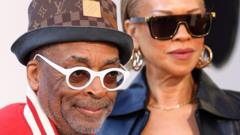As Tidjane Thiam grapples with the legal ramifications of losing his Ivorian citizenship, Ivory Coast's political landscape faces questions about democracy and governance amidst rising disillusionment among voters.
A Red Card for Democracy: The Political Quandary in Ivory Coast

A Red Card for Democracy: The Political Quandary in Ivory Coast
The disqualification of Tidjane Thiam has sparked concerns over the democratic process in Ivory Coast ahead of the pivotal presidential elections.
Even with a distinguished international career, Tidjane Thiam's venture into the political arena of Ivory Coast has unveiled harsh truths about the nation's democratic integrity. As Thiam's aspirations to become president are thwarted by a recent court ruling that stripped him of his Ivorian citizenship due to his prior French nationality, the situation raises critical questions about the country's political process.
Thiam returned to the Ivory Coast after two decades in global finance, positioning himself as a viable candidate to succeed the aging President Alassane Ouattara, who at 83 is completing his third term. Initially hailed as a strong contender, Thiam's momentum shifted abruptly on April 22, when a court ruled that his dual nationality disqualified him from participating in the upcoming elections. This decision is particularly impactful as he was chosen as the Democratic Party of Ivory Coast's candidate just days prior.
This legal setback finds its roots in a post-independence law restricting dual nationality, revealing the lingering specter of identity politics that once fueled civil strife in the region. The exclusion of Thiam, along with other opposition figures like former President Laurent Gbagbo, may result in a scenario where Ouattara or a allied successor runs unchallenged, potentially exacerbating public disenchantment with the political system.
Despite the progressive narrative of a recovering economy under Ouattara’s leadership, the political climate in Ivory Coast is colored by past grievances. This backlash against established politics mirrors sentiments in West Africa, where military coups have recently gained a foothold.
The electoral landscape could have benefited from Thiam’s centrist platforms, but the ramifications of the court’s decision may reinforce a political environment devoid of substantial opposition, leading to decreased faith in electoral democracy.
Amid attempts to appeal the court’s ruling, the Thiam team hopes to re-enter the presidential contest through political negotiations, underscoring the fragile nature of Ivory Coast’s democracy as it approaches a pivotal moment. As the country stands on the brink of potentially significant political turbulence, the interplay between legal interpretations and national identity could reshape the narrative of democracy in the region.


















